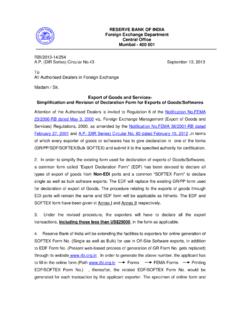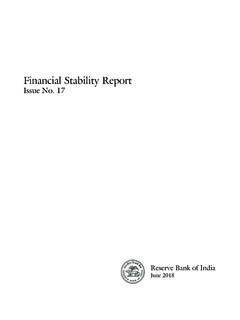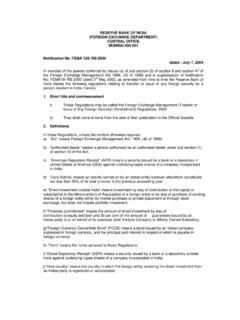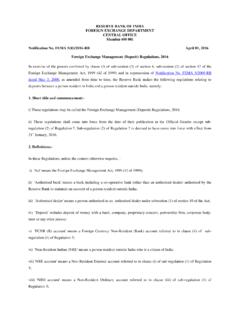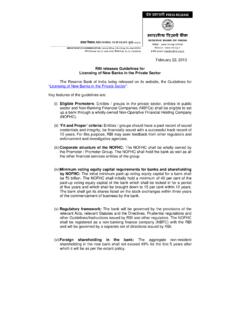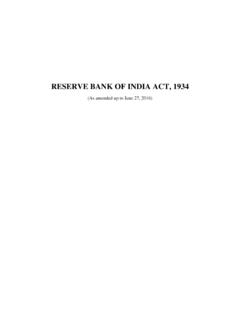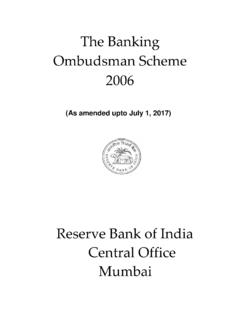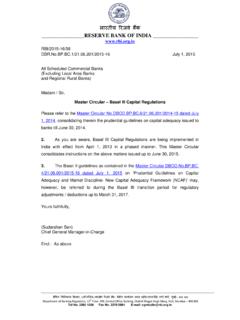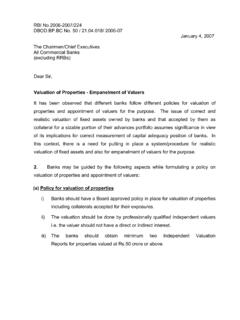Transcription of भारतीय ररज़र्व बैंक RESERVE BANK OF INDIA
1 _____RESERVE BANK OF INDIA_____ , , , , , , - 400018 : 022 - 2493 9930 - 49; : 022 - 2497 4030 / 2492 0231; : Department of Co-operative Bank Regulation, Central Office, Garment House, 1 Floor, , Worli, Mumbai - 400018, INDIA Phone: 022 - 2493 9930 - 49; Fax: 022 - 2497 4030 / 2492 0231; Email: : - , , , Caution: RBI never sends mails, SMSs or makes calls asking for personal information like bank account details, passwords, etc. It never keeps or offers funds to anyone.
2 Please do not respond in any manner to such offers. RBI/2015-16/44 (PCB) MC July 1, 2015 The Chief Executive Officers All Primary (Urban) Co-operative Banks Madam / Dear Sir, master circular - income Recognition, Asset Classification, Provisioning and Other Related Matters - UCBs Please refer to our master circular UBD BPD (PCB) MC dated July 1, 2014 on the captioned subject (available at RBI website ). The enclosed master circular consolidates and updates all the instructions / guidelines on the subject issued up to June 30, 2015 as listed in the Appendix. Yours faithfully (Suma Varma) Principal Chief General Manager Encl: As above master circular income Recognition, Asset Classification, Provisioning and Other Related Matters Contents Sl No Particulars Page No. 1. GENERAL 1 2. NON-PERFORMING ASSETS (NPA) 1 Classification of assets as Non-Performing 1 Treatment of Accounts as NPAs 5 Record of Recovery 5 Treatment of NPAs Borrower wise and not Facility-wise 6 Agricultural Advances 6 Housing Loans to staff 6 Credit Facilities backed by Guarantees by Central/ State Governments 7 Project Financing 7 Prudential Guidelines on Restructuring of Advances 7 Other Advances 16 Recognition of income on Investment treated as NPA 17 NPA Reporting to RESERVE Bank 17 3.
3 ASSET CLASSIFICATION 17 Classification 17 Definitions 17 Guidelines for Classification of Assets 19 Basic Considerations 19 Advances Granted under Rehabilitation Packages Approved by BIFR/Term Lending Institutions 19 Internal System for Classification of Assets as NPAs 19 4. income RECOGNITION 20 income Recognition Policy 20 Reversal of income on Accounts Becoming NPAs 21 Booking of income on Investments in Shares & Bonds 21 Partial Recovery of NPAs 21 Interest Application 22 5. PROVISIONING NORMS 23 Norms for provisioning on Loans & Advances 23 Provisioning for retirement benefits 26 Provisioning norms for sale of assets to SC/ RC 27 Provisioning pertaining to Fraud Accounts 27 Guidelines for provisions in specific cases 28 6. Divergence in asset classification & provisioning due to non compliance with RBI guidelines 30 Annex I: Direct Finance to Farmers for Agricultural Purposes 32 Annex 2: Proforma 33 Annex 3: Illustrative Accounting Entries to be passed in respect of Accrued Interest on both the Performing and NPAs 37 Annex 4: Clarification on certain frequently asked questions 39 Annex 5: Prudential Guidelines on Restructuring - key concepts 43 Annex 6: Prudential Guidelines on Restructuring - report format 45 Annex 7: Prudential Guidelines on Restructuring - illustrations 46 Annex 8: Guidelines on asset classification of projects under implementation 49 Appendix 53 1 master circular income Recognition, Asset Classification, Provisioning and Other Related Matters 1.
4 General In order to reflect a bank's actual financial health in its balance sheet and as per the recommendations made by the Committee on Financial System (Chairman Shri M. Narasimham), the RESERVE Bank has introduced, in a phased manner, prudential norms for income recognition, asset classification and provisioning for the advances portfolio of the banks. Broadly, the policy of income recognition should be objective and based on record of recovery rather than on any subjective considerations. Likewise, the classification of assets of banks has to be done on the basis of objective criteria, which would ensure a uniform and consistent application of the norms. The provisioning should be made on the basis of the classification of assets into different categories. The requirements of the State Co-operative Societies Acts and / or rules made thereunder or other statutory enactments may continue to be followed, if they are more stringent than those prescribed hereby.
5 With the introduction of prudential norms, the Health Code based system for classification of advances has ceased to be a subject of supervisory interest. As such, all related reporting requirements, etc. also ceased to be a supervisory requirement, but could be continued in the banks entirely at their discretion and the management policy, if felt necessary. 2. Non-performing Assets (NPA) Classification of Assets as Non-Performing An asset becomes non-performing when it ceases to generate income for the bank. Earlier an asset was considered as non-performing asset (NPA) based on the concept of 'Past Due'. A 'non performing asset' (NPA) was defined as credit in respect of which interest and / or installment of principal has remained 'past due' for a specific period of time. The specific period was reduced in a phased manner as under: Year ended March, 31 Specific period 1993 4 quarters 1994 3 quarters 1995 2 quarters An amount is considered as past due, when it remains outstanding for 30 days beyond the due date.
6 However, with effect from March 31, 2001 the 'past due' concept has been dispensed with and the period is reckoned from the due date of payment. 2 With a view to moving towards international best practices and to ensure greater transparency, '90 days' overdue* norms for identification of NPAs have been made applicable from the year ended March 31, 2004. As such, with effect from March 31, 2004, a non-performing asset shall be a loan or an advance where: (i) Interest and / or installment of principal remain overdue for a period of more than 90 days in respect of a Term Loan. (ii) The account remains 'Out of order'@ for a period of more than 90 days, in respect of an Overdraft / Cash Credit (OD/CC). (iii) The bill remains overdue for a period of more than 90 days in the case of bills purchased and discounted, (iv) In the case of direct agricultural advances as listed in Annex 1, the overdue norm specified at para would be applicable.
7 In respect of agricultural loans, other than those specified in Annex 1, identification of NPAs would be done on the same basis as non-agricultural advances. (v) Any amount to be received remains overdue for a period of more than 90 days in respect of other accounts. * Any amount due to the bank under any credit facility, if not paid by the due date fixed by the bank becomes overdue. @ "An account should be treated as 'out of order' if the outstanding balance remains continuously in excess of the sanctioned limit / drawing power. In cases where the outstanding balance in the principal operating account is less than the sanctioned limit / drawing power, but there are no credits continuously for 90 days or credits are not enough to cover the interest debited during the same period, these accounts should be treated as 'out of order'".
8 Tier I Banks # were permitted to classify loan accounts including gold loans and small loan upto `1 lakh as NPAs based on 180 days delinquency norm instead of the extant 90 days norm. This relaxation was in force upto March 31, 2009. The relaxations were given for the explicit purpose of enabling the UCBs concerned to transit to the 90 day NPA norm in the year 2009-10 by building up adequate provisions and strengthening their appraisal, disbursement and post disbursement procedures. Accordingly, with effect from 1 April 2009, Tier I UCBs would also classify an account as NPA based on 90-day NPA norm as indicated in para above ---------------------------------------- ---------------------------------------- ------------ # (i) Banks having deposits below `100 crore, operating in a single district. ii) Banks with deposits below `100 crore operating in more than one district, provided the branches are in contiguous districts and deposits and advances of branches in one district separately constitute at least 95% of the total deposits and advances respectively of the bank.
9 3 iii) Banks with deposits below `100 crore, whose branches were originally in a single district but subsequently, became multi-district due to reorganization of the district. The deposits and advances as referred to in the definition may be reckoned as on 31st March of the immediate preceding financial year. All UCBs shall classify their loan accounts as NPA as per 90-day norm with effect from 1 April 2009. Agricultural Advance (i) With effect from September 30, 2004 the following revised norms are applicable to all direct agricultural advances (Annex 1): a) A loan granted for short duration crops will be treated as NPA, if the installment of principal or interest thereon remains overdue for two crop seasons. b) A loan granted for long duration crops will be treated as NPA, if the installment of principal or interest thereon remains overdue for one crop season.
10 (ii) For the purpose of these guidelines, "long duration" crops would be crops with crop season longer than one year and crops, which are not "long duration" crops would be treated as "short duration" crops. (iii) The crop season for each crop, which means the period up to harvesting of the crops raised, would be as determined by the State Level Bankers' Committee in each state. (iv) Depending upon the duration of crops raised by an agriculturist, the above NPA norms would also be made applicable to agricultural term loans availed of by him. In respect of agricultural loans, other than those specified in the Annex 1 and term loans given to non-agriculturists, identification of NPAs would be done on the same basis as non-agricultural advances, which, at present, is the 90 days delinquency norm.

